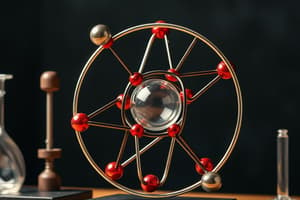Podcast
Questions and Answers
What is the modern view of an atom?
What is the modern view of an atom?
- An atom is only composed of protons and neutrons
- An atom is composed of molecules and solids
- An atom is made up of protons, neutrons, and electrons (correct)
- An atom is indivisible and has no internal structure
According to Dalton's atomic theory, how did he imagine an atom?
According to Dalton's atomic theory, how did he imagine an atom?
- Extremely small and indivisible (correct)
- Made up of protons, neutrons, and electrons
- Extremely large and divisible
- Consisting of only subatomic particles
Which subatomic particles make up atoms?
Which subatomic particles make up atoms?
- Protons, molecules, and electrons
- Electrons, protons, and neutrons (correct)
- Neutrons, electrons, and molecules
- Protons, atoms, and neutrons
What is the size of an average atom?
What is the size of an average atom?
What is the smallest particle of an element that still retains the identity and properties of the element?
What is the smallest particle of an element that still retains the identity and properties of the element?
What is the modern definition of an atom?
What is the modern definition of an atom?
According to modern understanding, what are the three subatomic particles that make up atoms?
According to modern understanding, what are the three subatomic particles that make up atoms?
How did Dalton's atomic theory define an atom?
How did Dalton's atomic theory define an atom?
What is the size of an average atom?
What is the size of an average atom?
What are atoms made up of?
What are atoms made up of?
Flashcards are hidden until you start studying




